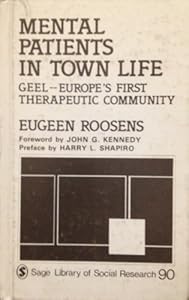Tuesday, September 23, 2014
Geel
I've been reading a book about Geel: Mental Patients in Town Life: Geel--Europe's First Therapeutic Community. It's old, published in 1979, but fascinating. Most references to Geel in contemporary literature are fleeting and un-nuanced. This is a more in-depth and honest account of life in Geel. I've linked to things about Geel on this blog before, but it's basically a town in Belgium in which there is a centuries-old tradition of caring for mentally ill patients in foster homes in the town.
What stuck out to me the most is this book's observation that the people who took in boarders in Geel were primarily middle or lower class. They spoke of their initial impulse to take in boarders in economic terms--for the money that it brought them. Although, as the book notes, their commitment to their boarders became something more than an economic relationship over time. This strikes me as a Tocquevillian insight: that people are guided by self-interest rightly understood--perhaps they initially act selfishly, because it's in their interests, but selfishness doesn't explain the whole of their actions. (This is counter the typical narrative about Geel--that people are guided by their society's tradition of taking in borders and by their Christian charity.)
This account of Geel is also attentive to the way in which changing economic realities affects peoples' willingness to take on boarders. A growing middle class means that not as many people are swayed by the extra money. An economic world in which work does not revolve around the home means that extra children and extra boarders are not as valuable of a contribution (whereas in the past at Geel, boarders were in many cases helpful, doing chores around the house and errands for the family).
The book also observes that the boarders are treated differently from the non-patients. The book states this in an almost pejorative way (although the book itself uses outdated language of "normal" and "non-normal"). I found this curious. My experience at L'Arche was always that the "community members" were treated differently from the "assistants." This wasn't a negative thing, in my opinion; it simply reflected the different strengths and weaknesses that each person brought to the community life.
Subscribe to:
Post Comments (Atom)


No comments:
Post a Comment